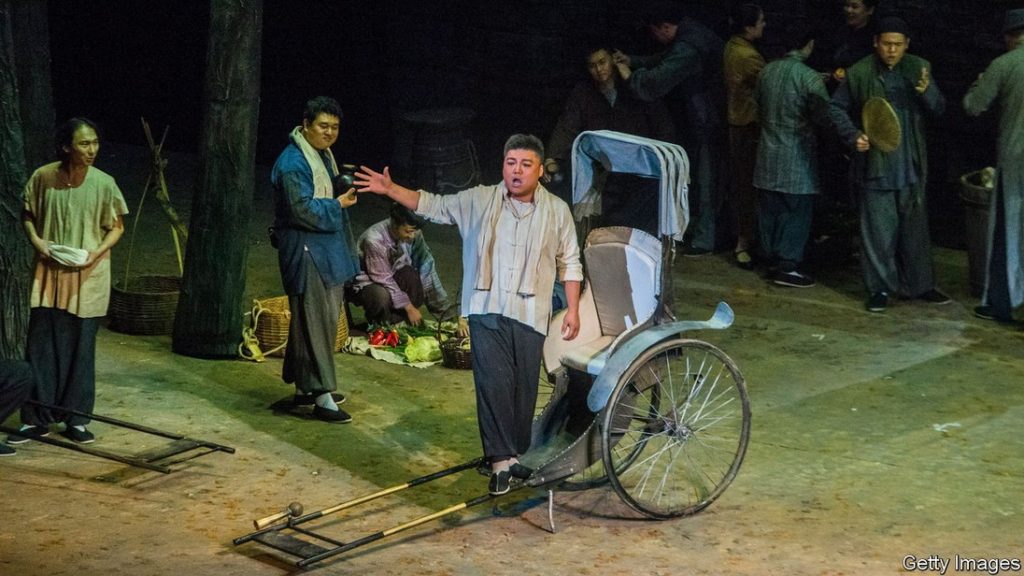
PUBLISHED IN 1937, “Rickshaw Boy” tells the story of Xiangzi, a young man trying to eke out a living in Beijing. At the beginning of the novel, he is kind and determined. He has no money and no real prospects, but reckons that with hard work he will be able to buy a rickshaw and build a life for himself. The cart would “guarantee his freedom and independence”, Xiangzi thinks. “Owning a rickshaw meant never having to suffer mistreatment or do the bidding of people who rented them out.”
By the end of the tale, he is a changed person. Each time he has bought—or come close to buying—a rickshaw, his dream has been taken from him. His loved ones have died. He has become selfish and cruel. Lao She, the author, intended the novel to be a critique of individualism; the character’s fate might not have been so dire, the story suggests, had he organised with other rickshaw-pullers and worked as part of a collective. Yet “Rickshaw Boy” seemed to warn readers that you cannot prosper in an unjust society, no matter how hard you toil.
Much has changed since the 1930s. China’s gdp has ballooned. Life expectancy has more than doubled (it was a paltry 35 years when Lao wrote the book). In 1949, after a bloody civil war, the Communist Party seized power. Yet this month the rickshaw boy returned to the country’s consciousness, invoked by angry homeowners. They had studied “Rickshaw Boy” in school to understand how weak China was in a bygone era; it has also been adapted into a film and an opera (pictured). Now people saw themselves in the story.
Tens of thousands of homeowners in China are refusing to pay mortgages on unfinished apartments. Many buy homes before they are built, often ploughing their life savings into the initial down-payment, but developer defaults and bankruptcies have stalled construction across the country, leading buyers to fear their homes will never be finished. They see no reason to keep paying for homes they cannot live in; some struggle to pay back mortgage loans on top of existing rent. “If I pay one yuan for a bottle of water and the store does not give it to me, I can report it to the police. If I pay a developer 1.5m yuan for a home and they refuse to build it for me, nothing happens to them,” one furious buyer said. “If I go on the streets I’m called a rioter.”
In Zhengzhou, a city in central China, a group of homebuyers concluded their declaration of a mortgage boycott with a quote from “Rickshaw Boy”. (“Xiangzi’s money was stolen, his rickshaw was smashed, he himself was beaten. He was not even allowed to cry out in pain, even a whimper was a mistake.”) They added that there are now “tens of thousands of rickshaw boys” in China: “We must throw off our chains, and let those who steal our money and smash our rickshaws know that the rickshaw boy is no longer a sheep to be slaughtered.” Discussions on social media often contained references to the novel. Between July 11th and July 13th, daily Weibo searches for “Rickshaw Boy” rocketed from under 500,000 to nearly 5m. The novel entered Weibo’s “newly popular” list of books.
A young couple in Zhengzhou post videos of their experience of buying a home to more than 200,000 followers on Douyin (the sister app of TikTok in China). Each month they spend 70% of their salaries paying off a loan on an incomplete apartment on the 22nd floor of a 13-storey building. Last week the couple added—then removed—“modern-day rickshaw boy” to their channel description. Still up, however, is a 30-second clip showing the cover of the novel. “When I first read the book I did not understand it”, the caption says. “When I read it now, I am in it.”
Home ownership has long been extolled as part of the “Chinese dream” and so, perhaps unsurprisingly, the government is censoring social-media posts about the boycotts. The party might reject comparisons between the 1930s and the present day, too, given that it stakes much of its claim to legitimacy on having “stood up” from imperial domination. True, the current protesters are not penniless orphans. But “Rickshaw Boy” captures the frustration of thwarted ambition and the tragedy of living in a society that does not care for its citizens. At the end of the novel, Xiangzi “couldn’t help wondering what good it did to try so hard.”
By The Economist




